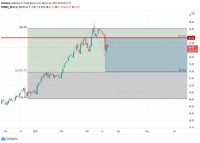|
Nikan has over 14 years experience in leading Wall Street and City firms on the buy and sell-side including Lehman Brothers, Goldman-Sachs, Deutsche Bank, Sanford Bernstein Alliance, Citadel and Nomura where he is currently Head of European Rates Strategy. He has worked in a variety of primarily technical or quantitative fixed income roles from Rates & Hybrids Structuring to Rates Strategy and Quantitative Modelling to Asset Allocation and Risk Management to Prepayment Analysis and Securitization and Capital Markets. Education: PhD Mathematics (Courant Institute, NYU), Asst Prof University of Illinois.
It had been obvious for some time that Murabaha represented a form of short-rate
financing, an Islamic alternative to a LIBOR contract. Hence the ability
to promise through the wa'd mechanism to enter into a forward Murabaha
could easily lead to forward financing methods. However, the fact that a
Murabaha, essentially a trade finance with a markup, could have this same
markup linked to LIBOR did essentially open up some possibilities. In
particular, why couldn't this same markup be linked to anything more exotic. For
instance, it has been said that if a Muslim owned a beverage store and sold
soft-drinks, his activities are permissible. If he also decided to 'keep up with
the Joneses' and sell soft-drinks which had a price which ratched up whenever
his next-door non-Muslim beer-selling neighbour ratched up his prices, this
activity is similarly permissible or halal. Profit Rate Swap Structure
Source: Allen & Overy For the floating leg, we are allowed Murabahas with markups linked to LIBOR. We can enter into consecutive Murabahas on a rolling basis, with Wa'd to enter into Murabaha at the market price + market determined LIBOR to make for rolling Murabahas. For the exotic leg, some scholars would allow the linkage of the Profit Rate of the Murabaha to be almost anything so long as it is determined as of the time of entering into the Murabaha. So range accruals (i.e., the profit rate is LIBOR + X accruing times the number of days LIBOR is in between LowerBound and UpperBound) and almost any exotic payoff can be used as a markup so long as it is set at the time the Murabaha is entered into.
It may even be possible to do away with the underlying purchases altogether,
especially if they are buys and sells of the same underlying commodity with the
same two counterparties, under the rule of set-offs. If so, the swap is very
much a regular swap except that all cashflows must be fixed before a given
Murabaha sale takes place (i.e., no 'in-arrears' style payments). This not a typical exotic swap and in this case the exotic leg has a delayed payment. The typical structure for a range accrual is to pay periodically (say every 3M) LIBOR(t)+X% times the number of days LIBOR(t) is between LowerBound and UpperBound, for t between 0 and 3M, with payment made at t=3M. In the above PRS version, t=3M is the first date that the coupon (or profit markup) is known with complete certainty and is then the date at which the Murabaha is entered into with payment of this markup at t=6M. This delay is nonstandard in the exotic world but is really only a small matter for traders, structurers, and clients. Sh Yusuf DeLorenzo's objections to DB's "Shariah Conversion Technology" (see reference link) applies equally well to this structure. Can we asset swap Pork Bellies for LIBOR using Murabahas and make it all seem Shariah Compliant? Possibly countering Sh DeLorenzo's objections, it should be possible to use a PRS as long as hedging the underlying cashflows is entirely halal. So, one could do cross curency swaps easily, do fixed for floating, but applying the same principle to various more exotic structures become significantly more challenging. One could see the application of maslaha or public interest in the permissibility of fixed for floating or cross-currency swaps, but then again we could have those with knock-out double-touch Asian Himalaya payoffs (I just made up a term, but used quite a few in common exotics parlance). Do they really help the common good? Your feedback and comments are very important to us, please feel free to contact the author via email |
Opalesque Islamic Finance Intelligence
Featured Structure: Shariah Compliant Profit Rate Swap By Nikan Firoozye, PhD |
|





 RSS
RSS











